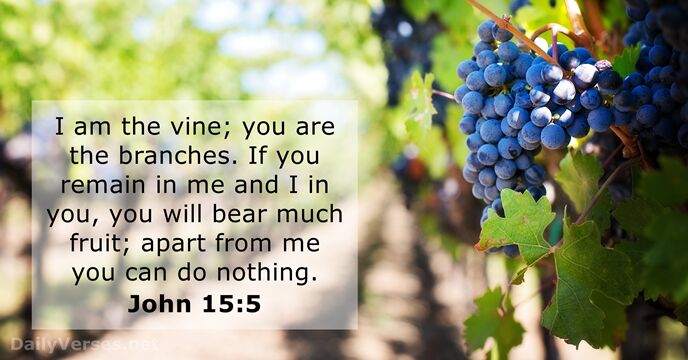THE SEED
‘I am the vine, ye are the branches: He that abideth in me, and I in him, the same bringeth forth much fruit: for without me ye can do nothing’. John15:5 KJV
The Bible tells us that Jesus referred to himself as the vine and to us as the branches. Putting this together, the vineyard comprises both the vine and its branches. If you’ve seen what a vine looks like, you can tell that a vine is a climbing plant that has branches developing from it. The vine itself is a miracle. The branches of the vine allow fruits to grow from them. The beauty of the vineyard itself is in the fruits.If the branches abide in the vine and the vine in the branches, they will bring forth fruits. For without the vine, the branches cannot bring forth fruits. In fact, without the vine, they will not even know how to bring forth these fruits.The fruits that are spoken of here are those of the Holy Spirit. They are the fruits of love, joy, peace, faith, and meekness, among others. If these fruits are not present in our lives as the branches, the branches will be gathered and burned. The Lord’s vineyard is a place of beauty and a safe abode. Jesus Christ is present as the true vine, and so we are as the branches.. He helps us through his word and God’s commandments to bear the enduring fruits of the Spirit, while ensuring that we keep bringing forth these fruits, He also looks after our requests being granted in God’s will.
BIBLE READING: John 15:4–11
PRAYER: Oh Lord, I pray that you continue to help me to bring forth the enduring fruits of the Spirit and that the evidence of this growth impacts my life to your glory. Amen.
OGBA AJARA OLUWA
IRUGBIN NAA
‘Èmi ni àjàrà, eyin ni eka: Ẹni tí ó bá ń gbé inú mi, àti èmi nínú re, òun náà ni ó ń so èso púpo, nítorí láìsí mi, eyin kò lè ṣe ohunkóhun.” Jòhánù 15:5 KJV
Bíbélì sọ fún wa pé Jésù pe ara re ní àjàrà, ó sì pè wá ní eka. Siso eyi di okan, ogba ajara naa ni ajara ati eka . Bí o bá ti rí bí àjàrà kan ṣe rí, o lè sọ pé àjàrà jẹ́ ohun ogbìn tí ń gùn, tí ó ní àwọn eka tí ń hù jáde láti inú re. Ajara funrararẹ jẹ iyanu. Àwọn eka àjàrà náà máa ń jẹ́ kí àwọn èso máa hù lára wọn. Ẹwà ọgbà àjàrà fúnra re wà nínú àwọn èso. Bí àwọn eka igi bá ń gbé inú àjàrà, tí wọ́n sì ń so èso jáde. Nítorí láìsí àjàrà, àwọn eka igi kò lè so èso. Awọn eso ti a sọ nihin ni ti Ẹmi Mimọ. Wọn jẹ awọn eso ti ifẹ, ayọ, alaafia, igbagbọ, ati iwa tutu, ati bebelo. Ti awọn eso wọnyi ko ba wa ninu igbesi aye wa bi awọn ẹka, a o kojọ, a o si Dana sunwon. Ọgbà àjàrà Olúwa jẹ́ ibi ẹwà àti ibi ààbò. Jesu Kristi wa bi ajara tootọ, ati pe awa dabi awọn ẹka… O ṣe iranlọwọ fun wa nipasẹ ọrọ rẹ ati awọn ofin Ọlọrun lati so eso ti Ẹmi ti o duro pẹ, lakoko ti o rii daju pe a tẹsiwaju lati so eso wọnyi jade, o si n bojuto ebe wa láti ri wipe o di mimuse ninu ife Ọlorun.
BIBELI KIKA: Jòhánù 15:4–11
ADURA: Oluwa, Mo gbadura pe ki o tẹsiwaju lati ṣe iranlọwọ fun mi lati mu awọn eso ti Ẹmi ti o duro pẹ jade ati pe ẹri ti idagbasoke yii ni ipa lori igbesi aye mi si ogo rẹ. Amin.
